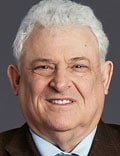Prominent medical and scientific journals have broken with tradition and taken a political stand, calling for a change in leadership in Washington, DC
Some are endorsing Joseph Biden Jr in his campaign to unseat President Donald Trump in the November election.
The move, which several editors acknowledge as unprecedented, may threaten the journals reputations as nonpartisan arbiters of science. But editors argue that the risk is warranted because the Trump administration is attacking the work of scientists, ignoring climate change, and bungling the response to the COVID-19 pandemic.

Dr Eric Rubin
"There is a pretty unanimous feeling, certainly among journal editors, but I think that reflects their readers, that things have gone badly wrong, and that it's important that we try to right things," Eric J. Rubin, MD, PhD, editor-in-chief of the New England Journal of Medicine, told Medscape Medical News.
"[O]ur current political leaders have demonstrated that they are dangerously incompetent" in the pandemic and should not be allowed to keep their jobs, Rubin wrote in an October 8 editorial. The journal has so far refrained from naming Trump in its editorials.
But today, Science published an editorial calling on scientists in general, and US Food and Drug Administration Commissioner Stephen Hahn in particular, to resist Trump's interference in COVID-19 vaccines and treatments.
And Scientific American, Nature, and The Lancet Oncology have all endorsed Biden by name, with Scientific American noting that this was its first endorsement in a US presidential campaign in the journal's 175-year history.
The White House did not immediately respond to a request for comment.

Dr Arthur Caplan
Taking political positions comes with peril for medical and professional journals, said Arthur Caplan, PhD, director of the Division of Medical Ethics at the New York University Grossman School of Medicine in New York City. "Many would argue that that's not the right forum," he told Medscape Medical News. "There are plenty of other places to express political points of view. There's a chance that they blur the line themselves between science and politics by speaking up."
However, Caplan says the journals are making the right call because they have an obligation to speak for scientists who have been "bullied" by the Trump administration.
Science editor H. Holden Thorp, PhD, who authored his journal's editorial, told Medscape Medical News that "I came out of my shell" in March when Trump tweeted that COVID-19 was no worse than the seasonal flu. "I thought the 'just the flu' tweet was incredibly dangerous," Thorp said, "because by that time, we were seeing enough of the basic science to know what a massive problem this is going to be."
Science cannot endorse political candidates, because it is part of the nonprofit American Association for the Advancement of Science, Thorp said. But he has followed up that first editorial with a stream of others criticizing the Trump administration.
And he sees the endorsements of Biden by the for-profit journals as no less valid than endorsements traditionally published by newspapers.
Speaking up can have consequences, said Eric Topol, editor-in-chief of Medscape. He first experienced blowback when he began warning about problems with the arthritis medication rofecoxib (Vioxx). "That taught me that there are a lot of hazards involved, because you're going up against, in that case, a very big company that wants to take you apart." Vioxx was eventually withdrawn from the worldwide market in September 2004.
Editorials can have an effect though. For example, Topol says that some of his more recent tweets and editorials have led him into direct conversations with FDA Commissioner Hahn and with representatives of Pfizer. And the Science editorial credits Topol with stiffening Hahn's resistance to the administration's meddling.
Topol, Thorp, and Rubin all said they had received vicious emails and tweets as a result of their recent positions, as well as moderate criticisms and many congratulations.
In the past, scientists may have stayed on the political sidelines out of concern that they might lose government funding. But with the Trump administration interfering in the scientific process, they feel they have little to lose, Thorp said. "If we're not going to play every card we have now, when would we?"
Will scientific journals snap back to their tradition of forbearance if a new administration shows more respect for science?
Caplan predicts they will, especially if new legal barriers can be erected to protect agencies like the FDA and CDC from political pressure. "I do think we're in extraordinary times, and the journals don't want to be political forums," he said.
But Thorp is not so sure that journals should ever pipe down. "I think, if anything, we should have been out there a little more in the past," he said. "But it took something like this to get folks to start saying things in a more courageous way."
Topol has disclosed financial relationships with Dexcom, Illumina, Molecular Stethoscope, Blue Cross Blue Shield, Quest Diagnostics, and MyoKardia. Thorp disclosed financial relationships with Artizan Biosciences and Hatteras Venture Partners. Rubin and Caplan have disclosed no relevant financial relationships.
Nature. Published online October 14, 2020
Scientific American. Published online October 1, 2020
N Engl J Med. Published online October 8, 2020
The Lancet Oncology. Published online October 2020.
Laird Harrison writes about science, health and culture. His work has appeared in national magazines, in newspapers, on public radio and on websites. He is at work on a novel about alternate realities in physics. Visit him at lairdharrison.com or follow him on Twitter: @LairdH.
For more news, follow Medscape on Facebook, Twitter, Instagram, and YouTube.
Medscape Medical News © 2020

Δεν υπάρχουν σχόλια:
Δημοσίευση σχολίου